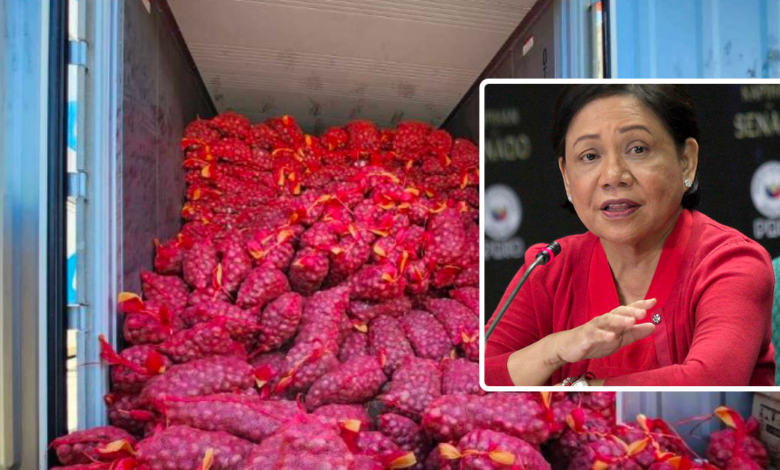
Big-Time Onion Smuggler Arrested: Villar Calls for Tougher Laws
In a recent development, a man named Jayson de Roxas Taculog found himself at the center of controversy, accused of large-scale onion smuggling in the Philippines. The arrest of the big-time onion smuggler, announced by Senator Cynthia Villar, sheds light on the ongoing efforts to combat economic sabotage in the agricultural sector.
The Arrest
Senator Villar, the sponsor of the 2024 budget of the Department of Agriculture (DA), revealed Taculog’s successful arrest during a Senate plenary debate. This marks a significant step in addressing the challenges posed by individuals engaged in smuggling activities that undermine the country’s agricultural interests.
Allegations Against Taculog
The big-time onion smuggler stands accused of smuggling a staggering 30 containers of onions, prompting serious concerns about the scale of such illicit activities. Senator Villar highlighted that despite facing 15 cases, most charges against Taculog were dismissed by the court, emphasizing the need for stricter measures against such offenses.
Calls for Non-Bailable Charges
Expressing her frustration with the leniency shown towards smugglers, Senator Villar called for non-bailable charges for individuals engaged in economic sabotage. She argued that such measures would serve as a deterrent, ensuring that those involved in smuggling activities face the consequences, even if some cases are dismissed.
Proposed Anti-Agricultural Economic Sabotage Act
In response to the challenges posed by agricultural smuggling, President Ferdinand Marcos Jr. certified Senate Bill No. 2432 as urgent. This proposed legislation, titled the Anti-Agricultural Economic Sabotage Act, aims to replace the existing Anti-Agricultural Smuggling Act of 2016. The urgency underscores the government’s commitment to addressing economic threats to the agricultural and fishery sectors.
READ: The New Agrarian Emancipation Act
Objectives of the Proposed Legislation
The primary objectives of the Anti-Agricultural Economic Sabotage Act include putting an end to smuggling, hoarding, profiteering, and cartel activities related to agricultural and fishery products. The proposed penalties for these offenses are severe, including life imprisonment and fines three times the value of the agricultural and fishery products involved.
Approach to Safeguard Agricultural Interests
The proposed legislation reflects a comprehensive approach to safeguarding the interests of the agricultural sector. By imposing stringent penalties, the government aims to create a robust deterrent against individuals seeking to exploit the agricultural economy for personal gain.
The arrest of the big-time onion smuggler, Jayson de Roxas Taculog, and the urgent push for the Anti-Agricultural Economic Sabotage Act signal a renewed commitment to protecting the agricultural and fishery sectors from illicit activities. As the government takes decisive steps to curb economic sabotage, it remains to be seen how these measures will impact the landscape of agricultural trade in the Philippines. The case of Taculog serves as a reminder of the challenges faced in ensuring the integrity and prosperity of the nation’s agricultural industry.




